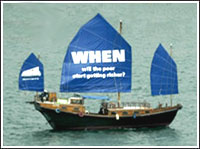 After six days of public posturing and haggling, negotiators at the World Trade Organisation’s Hong Kong ministerial made almost no progress on the issues at the heart of the Doha round of trade talks: cutting farm tariffs, freeing trade in industrial goods and opening services markets. A deal cleared by the Ministers set 2013 as an end date for farm export subsidies, extended some help for the WTO’s poorest states and offered little to African cotton producers. Agreement in Hongkong is seen as vital to WTO hopes for a draft trade treaty early in 2006, which could inject billions of dollars into the global economy and lift millions out of poverty.
After six days of public posturing and haggling, negotiators at the World Trade Organisation’s Hong Kong ministerial made almost no progress on the issues at the heart of the Doha round of trade talks: cutting farm tariffs, freeing trade in industrial goods and opening services markets. A deal cleared by the Ministers set 2013 as an end date for farm export subsidies, extended some help for the WTO’s poorest states and offered little to African cotton producers. Agreement in Hongkong is seen as vital to WTO hopes for a draft trade treaty early in 2006, which could inject billions of dollars into the global economy and lift millions out of poverty.
The reactions were predictably different. "The relief in the room is palpable. Everyone shares the sense we’ve succeeded, not completely... but with an impetus to finish the Round in 2006 - says the noting in the conference diary of Pascal Lamy . While developing countries gave it a cautious welcome. "India welcomes this final revised draft. From going round and round about we now seem to be setting course to a development agenda," said Commerce and Industry Minister Kamal Nath who represented India.
A result of six days of tough negotiations and bargaining between rich and poor nations, came the compromise text, that was approved by the full 149-state membership gathered for a ministerial conference in Hong Kong. It proposed eliminating export subsidies on cotton—a sensitive issue for the United States—in 2006, and proposed April 30, 2006, as a deadline for reaching a draft pact for the wider Doha trade round. It left open the possibility of dismantling rich nation cotton subsidies, a key African demand, at a faster pace than would eventually be agreed for all farm goods under a final deal.


